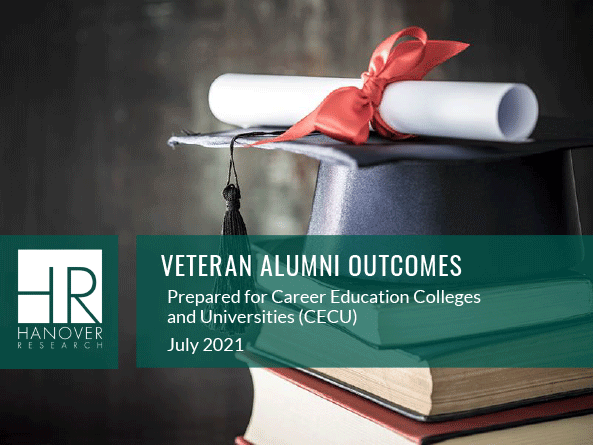
Veteran Alumni Report Positive Experiences at Proprietary Institutions According to New Survey
By Rachel Tripp, Director of Communications, Career Education Colleges and Universities (CECU)
A survey, conducted by Hanover Research on behalf of Career Education Colleges and Universities (CECU), aimed to help the organization and policymakers learn more about the needs and outcomes of veteran students and veteran alumni who attended a proprietary institution. CECU has long been a vocal advocate for increased access to high-quality education and career opportunities for servicemembers, veterans, and their families.
The survey results provided insight into how military-connected students and alumni perceive their experiences at proprietary institutions, helped understand what motivates servicemembers and veterans to pursue a career education program, and examined whether program outcomes align with alumni expectations.
Participation in the survey required that respondents be a United States veteran, family member or spouse of a veteran, active-duty military or a reservist who attended a proprietary institution. In the case of family members or spouses, their education must have been paid for using GI Bill funds. The survey was administered online from November 2020 to February 2021 and had 122 respondents. Separate from the survey, Hanover Research reached out and conducted in-depth interviews with 11 alumni of CECU member institutions.
Respondents reported positive experiences at proprietary institutions in relation to preparation for future success. Of those surveyed, a majority agreed or strongly agreed:
- Coursework reflected the current needs of their workplace (79%) and that their studies prepared them well for employment (78%);
- Their program of study helped them achieve their personal (83%) and career goals (75%); and
- The value of the education received at their institutions was worth the cost (80%).
Proprietary institutions align with veteran needs
Over one-third (40%) of respondents had attended another institution of higher education prior to enrolling at a proprietary institution. In fact, over half (53%) had previously enrolled in a public 2-year college. Several alumni reported dissatisfaction with traditional institutions due to mismatched teaching styles, generic requirements unrelated to major or skills goals, or non-recognition of the skills and knowledge they had already obtained through the military. Most respondents (60%) decided to pursue career studies at proprietary institutions to gain skills. They entered a program with the goal of gaining knowledge and skills to quickly enter the workforce and appreciate the opportunity to learn valuable skills and acquire credentials in a shorter time than if they had attended traditional institutions. In fact, several of the veterans interviewed felt that they could not have finished a slower four-year program.
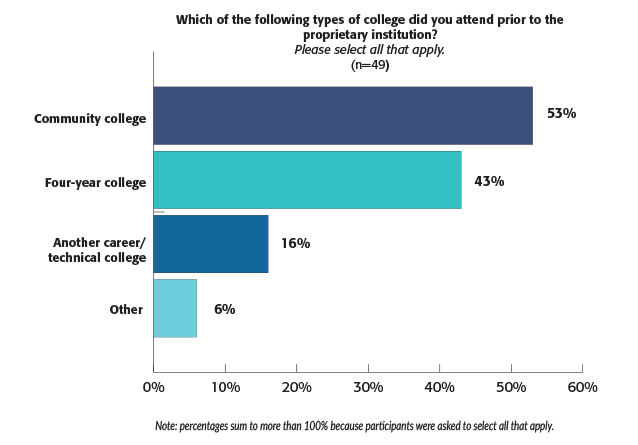
In addition to streamlined coursework, the flexibility and personalized approach associated with proprietary programs positively motivated veteran alumni. The chance to be in a hands-on environment, often with other student veterans or veteran instructors, helps promote a shared sense of community and camaraderie resonant of that found in active-duty environments.
“At [proprietary institution], most of the instructors were veterans. Most of the senior staff are veterans. They welcomed us like brothers and sisters which I enjoyed. We feel that we’re in the same team.” – Participant 5, Marines; Welding, Electrical Maintenance
Participants indicated that traditional institutions are often not as understanding of the special circumstances that come with being an active-duty service member, veteran, or reservist.
“They understood if we said ‘Hey, we can’t complete this day because of this operation or commitment. Can we complete it next week or a day late?’ I think a [traditional institution] would have hindered the whole process. I probably would have dropped out or disenrolled.” – Participant 8, Navy; Nursing
This sense of support and community found at proprietary institutions helps propel veteran students to success by honoring their military service and emphasizing that they can balance their coursework with their unique commitments.
How can proprietary institutions help veteran students achieve their goals?
More than half of respondents pursued career studies at a proprietary institution to gain skills (60%), and proprietary institutions were helpful in achieving this goal (82%).
In addition to gaining career skills, other top goals included:
- For general self-improvement/personal growth (66%)
- To earn more money (68%)
- To advance in their chosen field (69%)
Proprietary institutions may want to focus further on these areas to help meet these additional goals.
Did veteran students feel that they had met these goals upon graduation? Often, yes. More than three-quarters of respondents agreed that their program helped them achieve their personal goals (83%) and career goals (75%).
Participants overwhelmingly agreed that the value of their proprietary education was worth the cost (80%) and that the skills (76%) and knowledge (75%) acquired are relevant to their current work.
Career support is crucial to veteran student success
Veterans entering the civilian workforce particularly cited the importance of career preparation and placement support as part of their educational experience. Services like mock interview workshops, resume-building assistance, and externship programs were viewed as critical to participant success. Particularly for those veterans whose only prior employment had been through the U.S. military, this support made transitioning to the civilian workforce accessible and navigable.
“[My proprietary school] helped place us in those positions, and before my externship was even up, I was already hired. So 90 to 95 percent of us all had a job when we left school.” – Participant 7, Marines; Dental Assistant
Veteran students may prefer streamlined programming, the opportunity to train with fellow veterans and other adult learners, and value institutions that prioritize career placement support. But how do these components translate to career-specific outcomes?
Respondents indicated that they have experienced positive outcomes because of earning their degree or certification at a proprietary institution: Nearly two-thirds (63%) of respondents report increased income, 50% believe they have more career options as a result, and two-thirds of respondents say their current job is ‘very’ or ‘extremely’ related to the degree they earned at their proprietary institution.
“Had I not earned a degree, I would not have been marketable in any of the jobs that I’ve had since getting out. I also believe I was able to negotiate a better salary. Otherwise, I probably would have ended up doing something that did not require a bachelor’s, and the pay would have been much lower.” – Participant 8, Navy; Nursing
How will CECU use this information?
CECU is using the survey and interview results to showcase the value military-connected students assign to proprietary institutions, even after recognizing that a traditional institution could not meet their unique needs. Additionally, the results provide an opportunity for proprietary institutions to benchmark and identify areas for further improvement to addresses the needs of our nation’s heroes and their families. By better understanding the needs, preferences, and outcomes of our veteran alumni, we can work to ensure that incoming veteran students receive the support they deserve.
“Veteran students are often looking for opportunities to build on the skills and knowledge they gained in the military so that they can quickly apply those skills to building careers in the civilian workforce,” said CECU President and CEO Dr. Jason Altmire. “It is clear that proprietary institutions provide this opportunity effectively and in a way that allows veteran students to feel comfortable, encouraged, and welcomed.”
Full survey results and methodology visit the CECU website at career.org.
RACHEL TRIPP is CECU’s Director of Communications, reporting to Vice President of Communications Jenny Faubert. She comes to the association from the U.S. Office of Personnel Management, where she served as Deputy Director of Communications and Spokeswoman for the Federal Government. A former Young Voices Education Fellow, Rachel previously worked as Press Secretary for Concerned Veterans for America and held a variety of communications roles at the Charles Koch Institute. She holds a bachelor’s degree from the University of Massachusetts Amherst, a graduate certificate in organizational management from Harvard Extension School, and is pursuing an ALM in government from Harvard University’s School of Extension Studies.
Contact Information: Jenny Faubert // Vice President of Communications // 571-970-3941 // Jenny.Faubert@career.org // https://www.career.org/
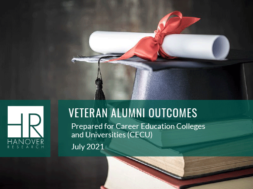
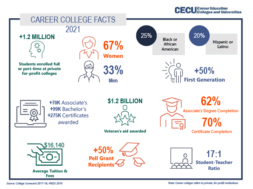








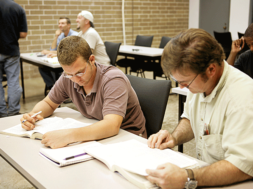
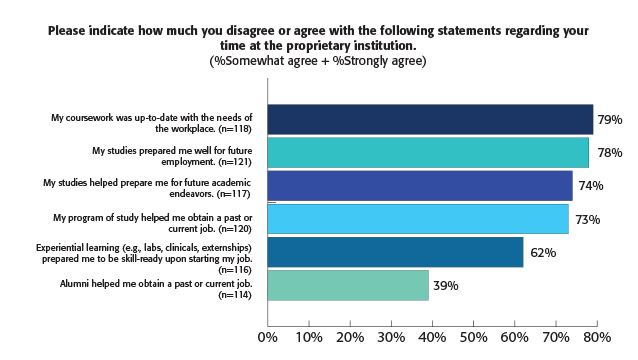
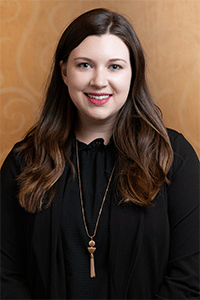
Comment(1)